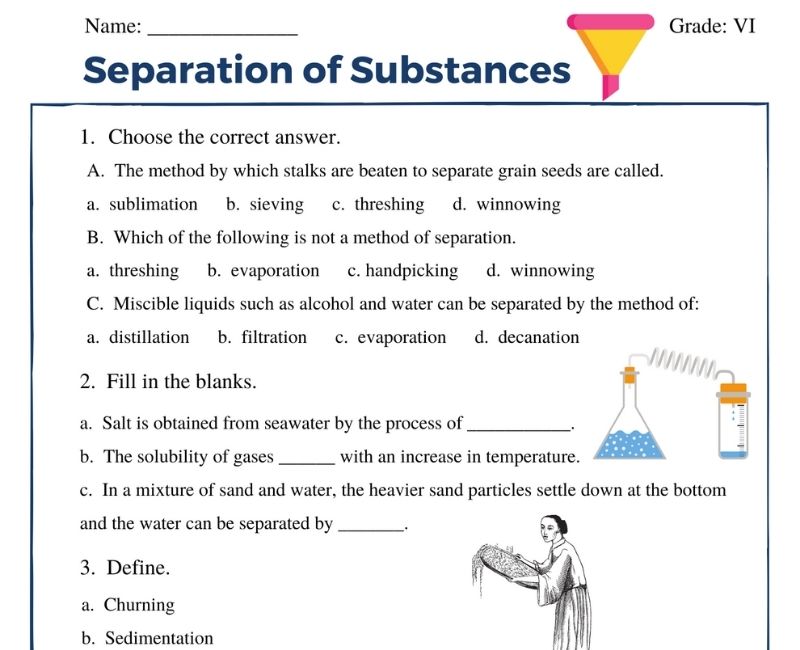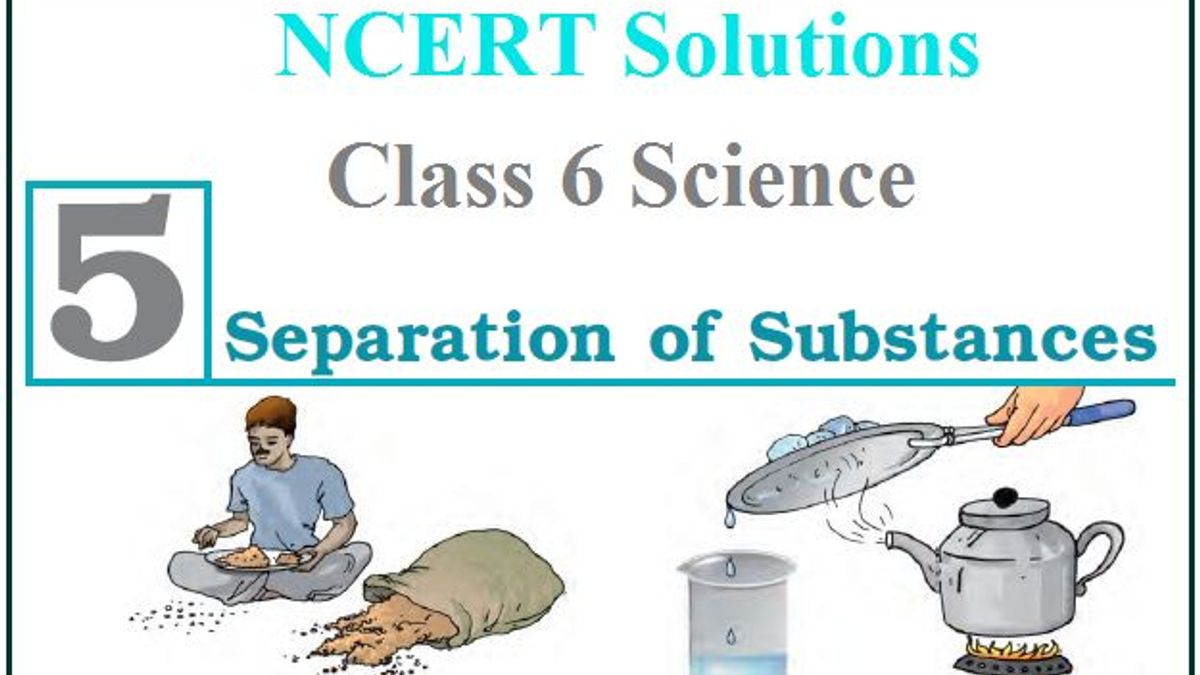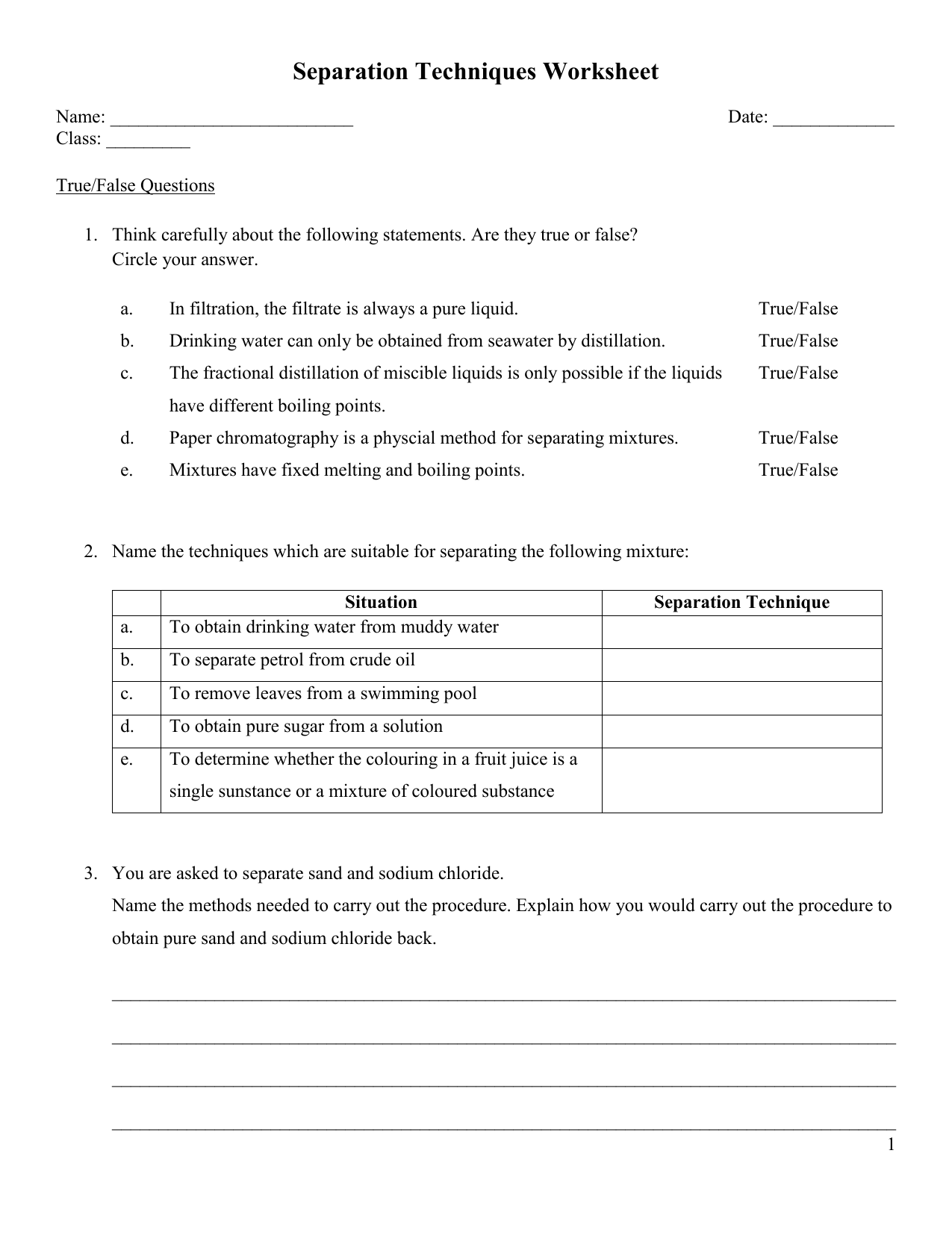
Separation Of Substances Class 6 Worksheet
Answer - (d.) Churning Explanation - Churning is the process of continuously moving milk or curd with skimmers to produce butter. 2. Which of the following processes can be used to separate a liquid from an insoluble solid? a.) Evaporation b.) Sedimentation c.) Distillation d.) Filtration Answer - (d.) Filtration

Class 6 Science Chapter 4 Question Answer Separation of Substances Class 6 New Science Ahead
Install Now CBSE worksheets for Separation of Substances worksheet for class 6 in PDF for free download. Science worksheets for class 6 CBSE includes worksheets on Separation of Substances as per NCERT syllabus. CBSE class 6 worksheets as PDF for free download Separation of Substances worksheets.

Class 6 Chemistry Worksheet on Chapter 5 Separation of Substances Set 2
Separation of Substances is the fifth chapter which we will study in Class 6 Science.In this chapter, Teachoo providesNCERT Solutions, Notes, Worksheets, MCQ, 1 Mark questions (with solutions).OnTeachoo, you can find explanations ofvarious concepts,NCERT questionsandextra questionsprepared by expert

Grade6ScienceOlympiad Sorting and Separation of Materials into GroupsWorksheet 1 Magazine
1 pt. Statement A: A mixture of cement and pebbles can be separated by using the sieve with small pores Statement B: A sieve with small pores will allow only small cement particles to pass through and will hold back the pebbles. a. Statement A is true only. b. Statement B is true only. c. Both are false. d.

Separation of Substances class 6 chapter 5 Science NCERT WORKSHEET FOR 6TH 7TH 8TH
The Worksheet Solution: Separation of Substances is an invaluable resource that delves deep into the core of the Class 6 exam. These study notes are curated by experts and cover all the essential topics and concepts, making your preparation more efficient and effective.

Exploring the Principles Printable Separation of Substances Worksheets for Class 6
A. Answer the following questions in short: 1. Why do we need to separate different components of a mixture ? Give two examples. 2. What is winnowing? Where is it used? 3. How will you separate husk or dirt particles from a given sample of pulses before cooking? 4. What is sieving? Where is it used? 5.

Separation of substances...Class 6 NCERT(Part3) YouTube
The ability of a substance to get dissolved in a given liquid is known as its ______. Multiple-Choice Question: Filtration is a process used to separate: (A) solid-solid mixture (B) liquid-liquid mixture (C) suspended solid-liquid mixture (D) liquid-liquid mixture Which of the following process is used to remove sand from water?

NCERT Solutions for Class 6 Science Chapter 5 Separation of Substances PDF
To help you with your preparation of the CBSE Class 6 Science Separation of Substances Worksheets with Answers for Chapter 5 in PDF format to download prepared by expert Science teachers from the latest edition of CBSE (NCERT) books. Register Online for NCERT Class 6 Science tuition on Vedantu to score more marks in CBSE board examination.

Separation of substances Class 6 chapter5 SinceScience YouTube
Worksheets Separation of Substances Separation of Substances TeacherJade Member for 2 years 5 months Age: 9-12 Level: P.6 Language: English (en) ID: 1168614 13/07/2021 Country code: TH Country: Thailand School subject: NRM (1031471) Main content: States of matters (1434818) Choose the correct answer Other contents: Methods to separate substances

class 6 science worksheets Chapter 5Separation of Substances PW
Worksheets Separation of substances Separation of substances Kiranrawat Member for 2 years 2 months Age: 12-13 Level: class 6 Language: English (en) ID: 1480951 04/10/2021 Country code: IN Country: India School subject: science (1070827) Main content: Methods of separation (1557790) methods of separation Loading ad. Share / Print Worksheet

Separation of Substances !! Class 6 !! YouTube
Exercise Questions 1. Why do we need to separate different components of a mixture? Give two examples. Solution: When two or more substances are mixed together, they form a mixture. Components of a mixture should be separated because some components may not be useful or may spoil the useful component of the mixture. Examples:

Separation Of Mixtures Worksheet
Filtration, Evaporation and Sublimation Worksheets. Exercises found in our printable Separation of Substances worksheets help students understand the key principles of filtration, evaporation, and sublimation. Put these concepts into practice with helpful questions and answers on the topics of boiling points, melting points, and solubility.

a poster with the words, separation of substances class 6 science worksheet get free practice
Grade 6 Separation of Substances Worksheets November 10, 2020 by worksheetsbuddy_do87uk A. Answer the following questions in short: 1. Why do we need to separate different components of a mixture ? Give two examples. 2. What is winnowing? Where is it used? 3. How will you separate husk or dirt particles from a given sample of pulses before cooking?

class 6 science worksheets Chapter 5Separation of Substances PW
1. State True/False: i. The property used in separating a mixture of two solid by winnowing is difference in weight. Answer: True ii. The chemical used for loading is baking soda. Answer: False iii. A mixture of milk and water can be separated by filtration. Answer: False iv.

Class 6 Chemistry Worksheet on Chapter 5 Separation of Substances Set 1
Answer: True/False. Separation of substances Worksheet-13 Â Crossword: The process of crushing of the harvested stalks using bullocks. The method which is used to separate the unwanted substance present in smaller quantities. If the components are of different sizes, they can be separated by this method.

Class 6 Chemistry Worksheet on Chapter 5 Separation of Substances Set 3
a) Threshing b) Winnowing c) Sieving d) Filtration Q-2: The process of converting water vapour into liquid is known as ________. a) Decantation b) Condensation c) Evaporation d) Filtration Q-3: Which of the following factors can be used to dissolve more sugar in water before it reaches saturation? a) Cooling b) Heating c) Constant Stirring